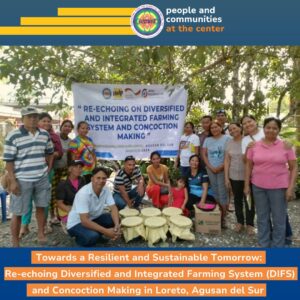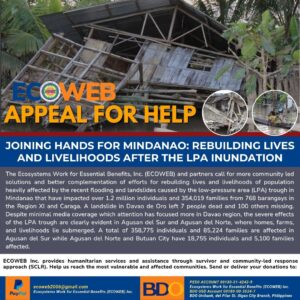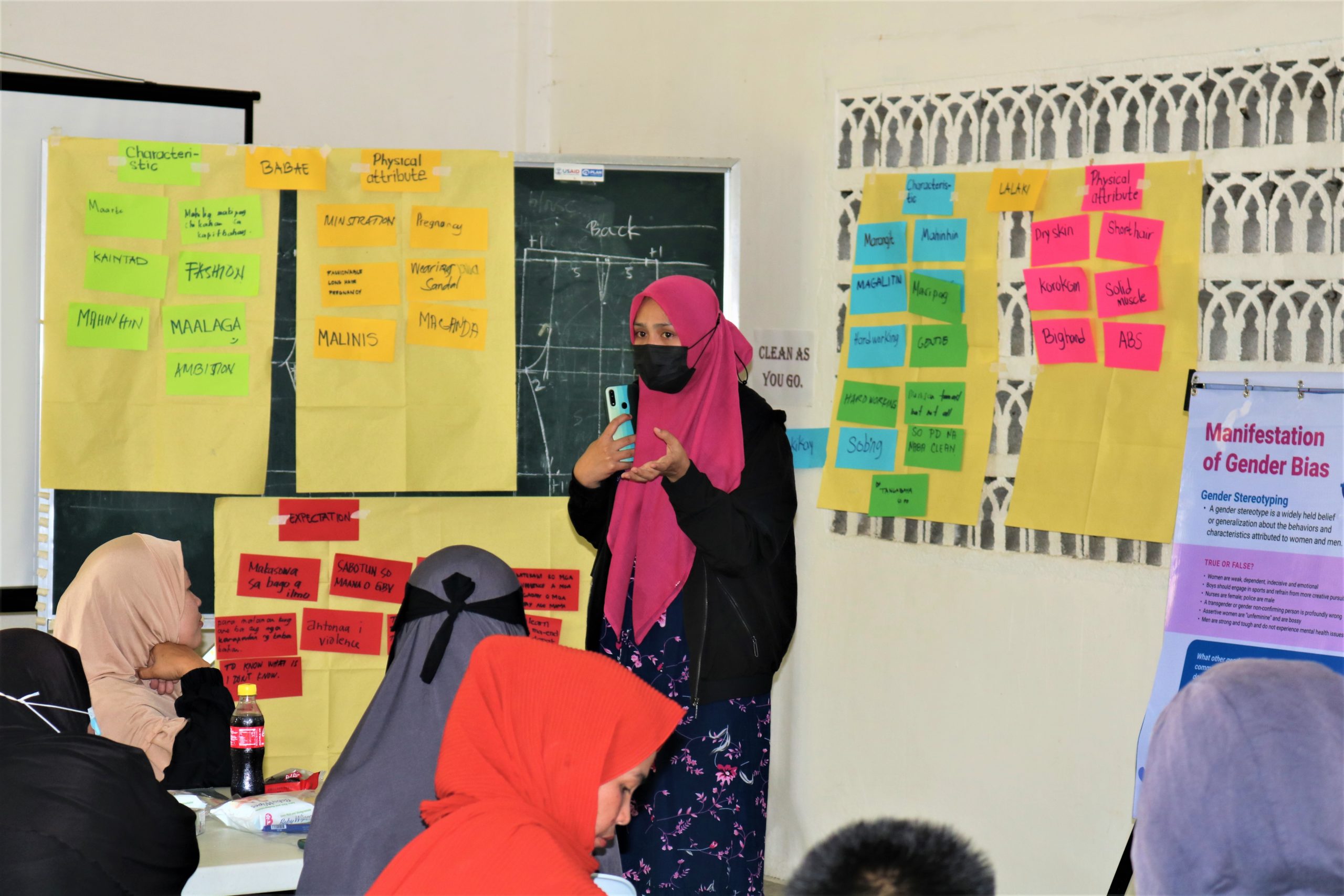“My experiences with my family and the people within my community inspired me the most… I have been deeply involved in community volunteering and initiatives aimed at improving living conditions and promoting sustainable development,” These words from Hannah Mae E. Bertonia encapsulate her journey and determination to bring clean drinking water to La Flora, Talacogon, Agusan del Sur. As the Project Manager of “Pag Sag-ob hong Malimpyo nga Tubig” (to fetch clean drinking water), Hannah is an inspiration and symbol of hope and leadership in her community.
The Roots of Inspiration
Hannah’s journey began with her graduation from the University of Southeastern Philippines-Pamulaan Center for Indigenous Peoples Education in 2022. Following her studies, she volunteered with the Foundation for the Development of Agusanon, Inc. (FDAI), which had supported her during her education. Her participation in the Mindanao Young Leaders Programme, was pivotal. This program equips young leaders with skills in action research and project management focused on social development issues.
Hannah is currently in a six-month contract with ECOWEB and the project is supported by Ecosystem Works for Essential Benefits, Inc. (ECOWEB), in partnership with Mindanao Young Leaders Programme which managed and run by UnionAID in partnership with Victoria University of Wellington (VUW) and Interfacing Development Intervention for Sustainability supported by New Zealand Ministry of Foreign Affairs and Trade as part of its Aoteraroa New Zealand’s International Development Cooperation programme | Nga Hoe Tuputupu-mai-Tawhiti. These collaborations provide technical expertise, financial support, and networking opportunities crucial for the project’s success.
The goal is to engage with the community to understand why they don’t have access to potable water sources and to co-create a community-led project to address this issue.
Crafting a Sustainable Solution
The project is divided into two phases. Phase I focuses on understanding the reasons behind the community’s lack of potable water and co-creating solutions with the community. This involves recruiting and training seven volunteers in indigenous participatory action research, conducting comprehensive research, and co-designing an action plan with community members.
“The goal is to engage with the community to understand why they don’t have access to potable water sources and to co-create a community-led project to address this issue,” explains Hannah. The objectives of Phase I include training volunteers, understanding the history and factors leading to limited access to potable water, and co-designing an action plan with community participants.
Within this project, gender and social inclusion are critical aspects. “We will ensure that the activities are gender sensitive and the participants will not just focus on men and women but also include members of the LGBTQIA+ community and Persons with Disability (PWD),” states Hannah. The project aims to create safe spaces for all participants, ensuring that Indigenous Peoples, settlers, and individuals from diverse backgrounds can contribute and feel included.
“We will make sure that the project is inclusive and that all the participants are being involved in decision making and can raise their own voices without discrimination,” she emphasizes. The project team, being part of the community, will be sensitive to participants’ needs, feelings, and problems, communicating in a language everyone understands and employing strength-based approaches.
To ensure full participation, the project will eliminate barriers such as time constraints and transportation costs by scheduling activities when participants are free and providing transportation support. “We will also create safe spaces for the participants and make them feel that they are included,” adds Hannah.
Phase II, currently in progress, involves implementing the community-led actions derived from the research and planning in Phase I. This phase includes constructing and maintaining clean water facilities such as deep wells and rainwater harvesting systems, and seeking funders and sponsors to provide water purification and filtration systems for each household.
Community members actively participate in the project by attending training sessions, volunteering, and sharing knowledge, demonstrating a collective commitment to improving their living conditions.
A Collective Effort
The community’s response to the initiative has been overwhelmingly positive. Initially, Hannah faced skepticism due to her youth and inexperience. “One of the main challenges has been overcoming skepticism and resistance, partly because I recently graduated and lacked experience in managing projects, especially since the project initially had no funding for building a water system,” Hannah recounts. To address this, she focused on building trust through consistent communication, demonstrating the benefits of the projects, and involving respected local leaders to advocate for the initiative. Additionally, organizing hands-on training and providing education on the purpose of the project helped gain community support.
Community members actively participate in the project by attending training sessions, volunteering, and sharing knowledge, demonstrating a collective commitment to improving their living conditions. “The community has responded positively to the initiative. Householders have actively participated in the planning and implementation phases, especially those selected as household participants, contributing their time and resources,” says Hannah.
The community is already aware of the purpose of the project. They are willing to be part of the project to achieve our goals and objectives
Milestones
Although the project is still in its early stages, it has already made significant strides. One success story is the heightened awareness and enthusiasm within the community. Residents are eager to be part of the solution, leading planning efforts for the next phase and seeking additional support.
“The community is already aware of the purpose of the project. They are willing to be part of the project to achieve our goals and objectives,” Hannah shares. She highlights that access to clean water will significantly enhance health, cut healthcare expenses, and save time once spent fetching water from distant or unsafe sources, thereby improving overall community health and quality of life.
Navigating Leadership
As a young female leader, Hannah has faced gender biases and doubts about her capabilities. Her resolve and the project’s tangible progress have proven her competence and dedication. “As a young female leader, I have faced challenges such as gender biases and doubts about my capabilities from some individuals. However, I have managed these challenges by focusing on demonstrating competence and dedication through my actions and the results of our project,” she says.
The most rewarding aspects for her include witnessing health improvements, empowering community members, and fostering a sense of unity and collective effort. “Knowing that our work is making a real difference in people’s lives is incredibly fulfilling,” Hannah reflects.
Future Plans and Long-term Vision
Hannah envisions a future where every household in La Flora has access to clean water. Future plans include partnering with local governments and NGOs for technical and financial support, exploring new water purification technologies, and integrating comprehensive sanitation programs. “Our future plans for the project ‘Pag Sag-ob hong Malimpyo nga Tubig’ include partnering with local government units and non-governmental organizations for technical and financial support, exploring water sources and purification technologies to ensure every household has access to potable water, and strengthening the community’s capacity to manage and maintain water facilities independently,” she outlines.
She hopes that the project will serve as a model for other communities, demonstrating the power of grassroots initiatives. “In the long term, I envision a healthier, more resilient community with sustainable access to clean water. The project will lay the foundation for continued development and improved quality of life. It will also serve as a model for other communities facing similar challenges, demonstrating the power of grassroots initiatives,” Hannah envisions.
Hannah encourages other young women to believe in their vision, seek support, and remain resilient. She emphasizes the importance of building a network of supporters and staying committed to one’s goals.
Guiding the Next Generation
Hannah encourages other young women to believe in their vision, seek support, and remain resilient. She emphasizes the importance of building a network of supporters and staying committed to one’s goals. “My advice is to believe in your vision and stay committed to your goals. Don’t be afraid to seek help and build a network of supporters. Stay resilient in the face of challenges, and always be open to learning and adapting. Most importantly, remember that your leadership can inspire and create positive change,” she advises.
External organizations can support such initiatives through financial assistance, technical expertise, advocacy, and by connecting projects with potential partners. “External organizations and individuals can support by providing financial assistance, technical expertise, and resources for capacity-building. They can also help amplify our efforts by sharing our story and connecting us with potential partners and donors. Volunteer involvement and advocacy for policy changes that support community-led initiatives are also valuable forms of support,” she adds.
Lessons Learned
From her experience, Hannah has learned the importance of community involvement, effective communication, and collaboration. Small, consistent efforts can lead to significant positive changes, emphasizing the need for patience and persistence. “I have learned the importance of community involvement and ownership in achieving sustainable development. Effective communication, transparency, and collaboration are key to building trust and ensuring success. Lastly, small, consistent efforts can lead to significant positive changes, and it is essential to remain patient and persistent,” she reflects.
Hannah Mae E. Bertonia’s journey with the “Pag Sag-ob hong Malimpyo nga Tubig” project demonstrates the power of youth leadership and community involvement.
A Beacon of Hope
Hannah Mae E. Bertonia’s journey with the “Pag Sag-ob hong Malimpyo nga Tubig” project demonstrates the power of youth leadership and community involvement. Her story is an inspiring example of how dedication and collective effort can create meaningful change, bringing hope and a brighter future to La Flora, Talacogon. Through her unwavering commitment and the support of her community and external partners, Hannah is paving the way for a sustainable, inclusive, and healthier future. | Kin Barkly Tibang
PagSag-ob hong Malimpyo nga Tubig (Fetch Clean Water) at La Flora: Appeal for
Donations
“Pag Sag-obhong Malimpyo nga Tubig” or fetching clean water is a community-led project to facilitate access to potable water in La Flora, Talacogon, Agusan del Sur. La Flora faces a crisis with no access to potable water, affecting over 1,704 individuals or 530 households. The community experiences floods every year and, as a catch basin area, lacks a reliable source of potable water.
Funding for the Action Project from UnionAID is being used to engage the community in understanding the reasons behind the lack of potable water and co-creating a sustainable, community-led solution. This includes recruiting and training volunteers, conducting comprehensive research, community seeking partners or stakeholders and implementing the initial phases of constructing clean water facilities such as deep wells and rainwater harvesting systems to support the community’s potable water needs.
Ecosystems Work for Essential Benefits, Inc. (ECOWEB) is also seeking additional funding through donations to provide advanced water purification and filtration systems for each household. UnionAID’s funding which includes the foundational aspects of the project, together with the donations received, will directly contribute to the community by ensuring the water is safe to drink, significantly improving the health and well-being of the community members.
How You Can Help:
- Donate: Any amount will make a difference. {Donate here: GCASH [09203322524], BPI [0609370489], AUB [934-10-139962-9] Hannah Mae Bertonia}
- Spread the Word: Share our cause to reach more supporters. Check the official Facebook page of the project.
By supporting this project, you are helping to provide safe drinking water, improving health, and empowering the community of La Flora. Your generosity will create a lasting impact and bring hope to those in need.



